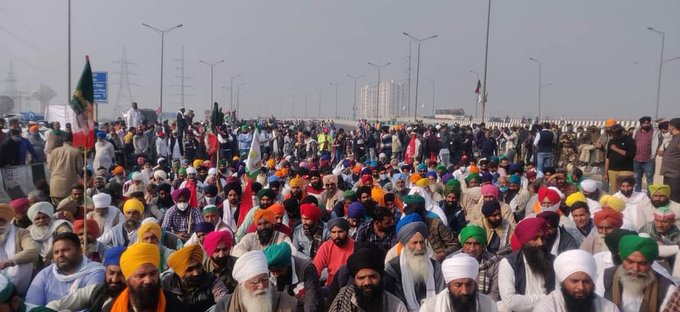Tens of thousands of farmers currently camped at three borders points of Delhi (India), announced they will mark the hundredth day of their protest today (6 March) by flying their flags and blockading a major highway (KMP Expressway), from 11am to 4pm. The farmers, organised under the union United Farmers’ Front (SKM), started mobilising in November 2020, in a strike that began in villages on the outskirts of Delhi. Most of the farmers are from the states of Punjab and Haryana, but were joined by workers from other regions after they identified corporate conglomerates as being behind what organised labour has called an attack on agricultural populations.
The strike is about three recently passed laws that workers say favour the big businesses and will only worsen struggles small scale farmers already face due to the COVID-19 pandemic. The laws are; the Farmers Produce Trade and Commerce (Promotion and Facilitation) Bill (2020), Essential Commodities Bill (2020), Farmers (Empowerment and Protection) Agreement of Price Assurance and Farm Services Bill (2020).
According to the Indian government (headed by Prime Minister Modi), these three bills, which were enacted in September 2020, were passed to ‘open the market’ and ‘give farmers more freedom’, but the farmers disagree. They say that the new laws are excluding them from the agricultual market, and benefit the huge corporates.
The Centre of Indian Trade Unions has condemned the Modi regime’s saying it would kill rights and entitlements of agricultural populations.
Mukesh Kulriya, member of the left-wing All India Students Association, called the laws ‘unconstitutional’. “We need to remember that this government also carried out labour reforms that snatched away essential labour rights from organised sector workers, allowing them to be hired and fired as their employers please and placing their right to unionisation under threat”, said Kulriya.
In his political climb to the top, Modi was backed by business dynasties such as the Ambanis (an agricultural company), the Adanis and the Tatas. In return, Modi has continuously attacked sections of the working class and the working peoples as a whole, and enacted laws that benefit big business.
The KMP Expressway is 136kms long, and was inaugurated by Modi himself in 2018. The highway was built to alleviate the traffic and congestion into the capital city of New Delhi and in general the busy roads connecting northern and southern districts of Delhi.
This article was submitted on 10 February 2021. You may republish this article, so long as you credit the authors and Karibu! Online (www.Karibu.org.za), and do not change the text. Please include a link back to the original article


 Download PDF
Download PDF
